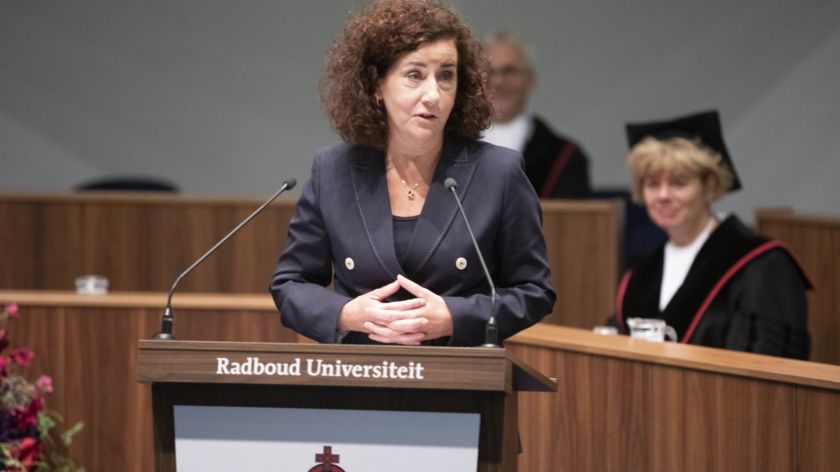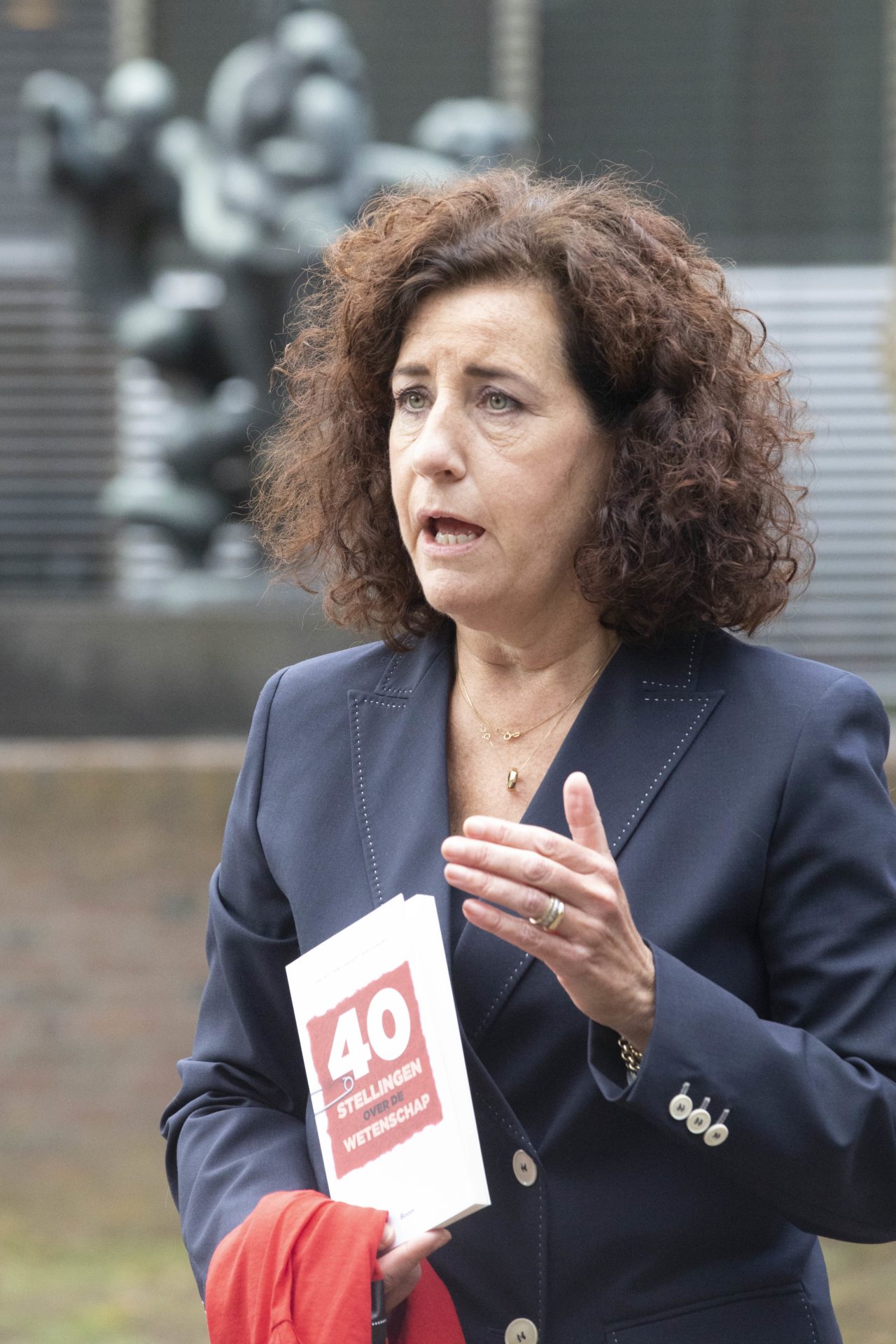Minister: ‘The combined pressure of workload, temporary contracts and coronavirus is too great’
-
 Ingrid van Engelshoven tijdens de opening van het academisch jaar 2020. Foto: Gerard Verschooten
Ingrid van Engelshoven tijdens de opening van het academisch jaar 2020. Foto: Gerard Verschooten
Academic development is more than just attending online lectures, Minister Ingrid van Engelshoven understands. During the opening of the academic year, she called on students to meet each other as much as possible. She also asked scholars who complain about workloads and underfunding to be patient: new funding plans are coming this autumn.
It was perhaps the last opportunity for Ingrid van Engelshoven to open the academic year at her alma mater, Radboud University, in her role as Minister of Education, Culture and Science. After all, there will be elections in March. And she didn’t want to let that opportunity pass her by, she said after her lecture on Monday. ‘I wanted to do this once before my term of office ended. I had a fantastic time here as a student, and afterwards I always felt connected to both the city and the university.’
Now you’re here as a minister.
‘Yes. When I studied here, I couldn’t have dreamed that I’d ever be in this position. It’s a beautiful moment, although I would have preferred the circumstances to be different.’
You’re referring to the coronavirus measures. In your lecture, you called on students to keep visiting each other at this time. Are you concerned about them?
‘Earlier, we also had concerns about stress-related complaints among students. We’re looking into how that’s going now, during the coronavirus outbreak. It’s certainly a challenge for first-year students to build bonds with their student city, lecturers and each other. That’s why I’m also calling on people to find ways to shape that together, while taking into account the current rules and limitations.’
‘Academic development is also about contact between lectures’
‘Contact is also extremely important for the academic development of young people. This development consists of so much more than lectures, books and examinations. I remember that well myself. It’s also about the contact between lectures such as discussions with each other and meeting people who have different perspectives. Fortunately, everyone – from lecturers to the Executive Board – is doing their absolute best to make that possible.’
There is a fear among students that a ‘corona diploma’ will soon be worth less. How do you guarantee quality?
‘You earn a diploma by passing exams and writing theses. That quality assessment is still as good as before. It just takes an incredible extra step on the part of the academic community to make sure everything runs smoothly.’
You told De Volkskrant newspaper that students will not be getting a discount on their tuition fees. Will the basic student grant come back, in your view?
‘The student loan system is really a different discussion than what the consequences of coronavirus are for students. In any case, we have seen that the student loan system has not led to a reduction in student intake. But you can’t look at the student loan system on its own because it’s closely linked to the housing market and the labour market, areas in which young people are also struggling. I think you have to look at the sides of that triangle in relation to each other.’
Ingrid van Engelshoven
Ingrid van Engelshoven (Delfzijl, 1966) moved to Belgium with her Dutch parents while she was still a baby. She attended primary and secondary school there. At the age of 18, she returned to the Netherlands to study policy and administrative sciences in Nijmegen. Later she studied law in Leiden. During her studies, she became politically active in the Democrats ’66 (D66) parliamentary party. She has held posts such as secretary to D66 founder Hans van Mierlo, party chair, and councillor for education in The Hague. In 2017, she was appointed Minister of Education, Culture and Science in the third Rutte government. Van Engelshoven is married and has a daughter, and she lives in The Hague.
Workload
The educational adjustments due to coronavirus, such as online lectures, have only increased the workload that many lecturers have been complaining about for a long time. It has led to several protests around the opening of the academic year. For example, the General Union of Education (AOb) and the Netherlands Trade Union Confederation (FNV) organised a bike tour between university cities in conjunction with academic protest group WOinActie.
The three figureheads of this latest protest group, professors Remco Breuker (Leiden), Ingrid Robeyns (Utrecht) and Rens Bod (Amsterdam), also published an indictment against the organisation and funding of universities: ‘40 statements about science’. Robeyns personally presented the book to the minister on Monday, prior to the opening of the academic year. One of the activists’ main demands is €1 billion in additional structural investments in science.
Last year, you admitted that this investment is necessary. Yet, that billion is once again not part of the budget that the Cabinet will be presenting in three weeks’ time on Budget Day, you said.
‘No.’
Why not? Everyone seems to agree that the money should be there.
‘As a cabinet, we are trying to prevent ourselves from sinking further into an economic morass. We need all the help we can get to ensure that people stay healthy and keep their jobs as much as possible. The university is not on the verge of bankruptcy; it is an institution whose public funding is continuing. There are more difficulties in the cultural sector, for which I am also responsible. That’s where we have to fill the need first.’
‘Yes, there will also have to be more money’
‘At the same time, it might sound a bit harsh, but the coronavirus has put the problems concerning temporary contracts and pressure resulting from high workloads front and centre on the current agenda. No one’s disputing this. For young researchers, hard work is not the problem: it’s the daily uncertainty about to whether they will still have a contract tomorrow. The coronavirus has now added to that, and the sum is too great. That’s why we’re now also investigating different way of providing funds for universities. Before the elections, there must be a foundation for a more future-proof financing system.’

The elections aren’t until March. Can you give us a hint about what’s coming?
‘The results will come this autumn, but it’s broadly clear where things are going. There will have to be more funding that does not depend on student numbers. A better balance is also needed between the first flow of funds (direct funding from the Ministry, ed.) and the second (indirect funding that is distributed via Dutch Research Council project applications, ed.), and there needs to be less competition between institutions for student numbers. And, yes, there will also have to be more money.
‘Together, this can lead to more permanent contracts and lower workloads. With more funding that does not depend on student numbers, smaller programmes, such as language studies, can continue to exist more easily, even if their student numbers are low.’
It has been clear for some time that things have to be done differently and with a larger budget. Before these recommendations and plans have been worked out in concrete terms, a year will have passed and we will already have formed a new government. Can’t it go any faster?
‘I understand that question very well. These kinds of complex processes take time; otherwise, accidents happen. In addition, I’ve been walking around The Hague long enough to know that you can only make agreements about these kinds of major system changes during government formations.
‘Don’t forget that there have been investments. The government has invested an extra half a billion euros in science during this period of office. And in the Spring Memorandum, universities were given half a billion euros to compensate for the rising number of students. Half a billion isn’t exactly small change!’
Conflict with the Bishops’ Conference
The conflict between the Bishops’ Conference and Stichting Katholieke Universiteit (SKU; the supervisory board of which oversees Radboud University and Radboud university medical center) has not escaped Minister Van Engelshoven’s attention. For years, SKU has demanded that the Roman Catholic Church exert less influence on the appointment of supervisors. Recently, a judge from the Enterprise Court had to break the deadlock, and he agreed with SKU.
The minister fully agrees with SKU’s position. ‘I think it’s no longer appropriate in this day and age for the Church to have a role in determining who is appointed or governs at this university, which provides publicly funded education.’



